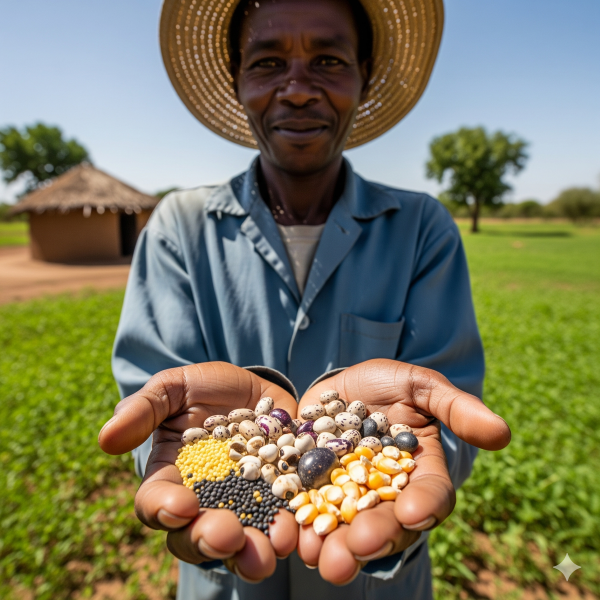Africa stands as a continent of profound paradox. It holds up to 60% of the world’s uncultivated arable land and is bathed in abundant sunshine, yet it continues to grapple with endemic hunger and food insecurity. While the causes are complex, a critical and often overlooked factor is the growing dependency on externally controlled agricultural systems. A dependency that begins with a single seed.
The promotion of patented Genetically Modified (GM) and single-use hybrid seeds is locking many African farmers into a relentless cycle of debt and dependency. Unable to save and reuse seeds as they have for millennia, farmers are forced to purchase new seeds and accompanying chemical inputs season after season, eroding both their profits and their autonomy.
The Double-Edged Sword of Modern Biotech
On the surface, the adoption rates of GM crops seem like a success story. In South Africa, GM maize adoption soared to over 90% by 2019, while GM soybeans account for 95% of plantings. Sudan witnessed a staggering 98% adoption of GM cotton within just four years of its introduction.
However, these figures often reflect aggressive corporate market penetration rather than a groundswell of farmer empowerment. While proponents argue for increased yields, these benefits can be inconsistent and often come at the cost of local control, concentrating power in the hands of a few multinational agribusiness corporations.
Cautionary Tales and Local Triumphs
The narrative that high-tech seeds are a universal solution has been proven false. In Burkina Faso, the widespread adoption of Bt cotton famously collapsed. While it initially offered resistance to pests, the crop produced shorter, lower-quality cotton fibre that fetched lower prices on the global market, ultimately making it economically unviable for farmers compared to their indigenous varieties.
Yet, this does not mean all biotechnology is detrimental. Nigeria offers a nuanced counter-example with its pod-borer-resistant (Bt) cowpea. Developed through public-sector research to solve a specific, devastating local problem. It demonstrates the potential of biotechnology when it is tailored to African needs and context, not just corporate bottom lines.
The Unseen Powerhouse: Africa’s Indigenous Seed Systems
Lost in the debate is a powerful truth: Africa’s informal seed systems, managed by smallholder farmers for centuries, are the continent’s true bedrock of food security. These systems still provide an estimated 80% of all seeds planted across sub-Saharan Africa.
Honed by generations of selection, these indigenous seeds possess remarkable genetic diversity. They are often more resilient to local climate stress, drought, and pests than their standardized, lab-grown counterparts. This is not antiquated agriculture; it is a living library of climate-adapted solutions.
Planting the Seeds of a Sovereign Future
Fortunately, powerful initiatives are underway to protect and revitalize this heritage:
- Kenya’s National Gene Bank is a vital repository, preserving over 50,000 traditional seed varieties. Its “Seeds of Resilience” project has successfully helped over 1,300 farmers re-adopt nearly 300 revitalized, climate-smart crops, including drought- and pest-resistant native sorghum.
- Global Collaboration: More than 100,000 unique African seed varieties from 177 species, from nitrogen-fixing trees to medicinal baobabs, have been secured in the Svalbard Global Seed Vault. This provides a crucial backup to safeguard the continent’s biodiversity against climate change and other shocks.
These efforts prove that the capacity and the wisdom already exist on the continent. The missing ingredient is political will. We train thousands of brilliant agricultural PhDs, yet their invaluable research on indigenous systems is too often sidelined by funding gaps and a policy environment that favours foreign imports over homegrown innovation.
A Mandate for African Leaders
The time for passive acceptance of external agricultural models is over. African leaders must reclaim their mandate to feed their own people. This requires a paradigm shift:
- Prioritize & Fund Indigenous Research: Invest significantly in national and regional research institutions to study, improve, and scale the use of native, climate-resilient crops.
- Invest in Seed Sovereignty: Support the establishment and growth of community seed banks and farmer-led seed enterprises to ensure local control over this fundamental resource.
- Reorient Pan-African Agencies: Mobilize public agricultural bodies like the Forum for Agricultural Research in Africa (FARA), ASARECA, and the Africa Rice Center to serve the interests of African farmers and consumers, not foreign corporations.
Our Land, Our Food, Our Future
This is a call to action for everyone—presidents and agriculture ministers, university deans and researchers, entrepreneurs and citizens. We must demand a continental Green Revolution that is unapologetically African: rooted in our seeds, powered by our scientists, and designed for our future.
The continent’s ability to achieve genuine food security and economic independence depends on it. It’s time we invest in our own soil and our own solutions.


